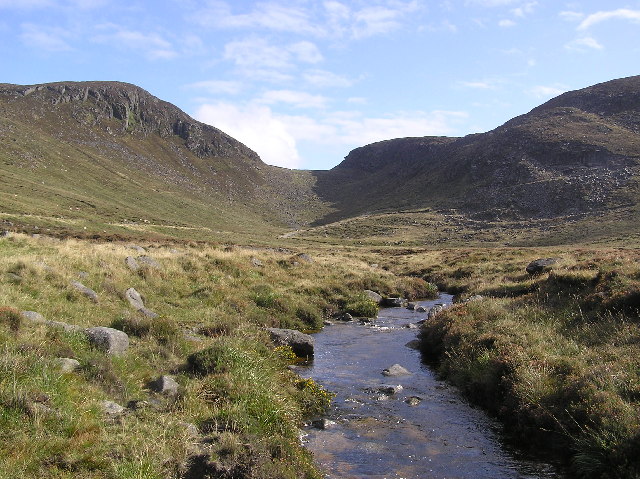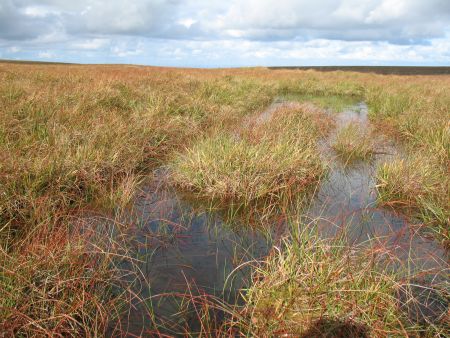 |
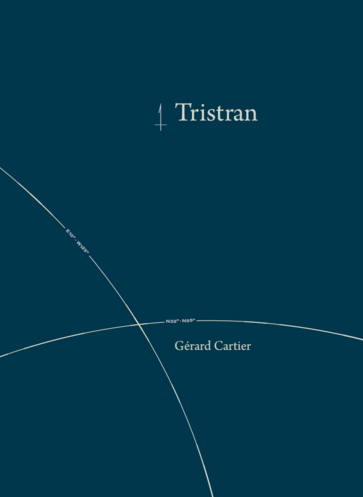 |
Tristran
Translated from the French by
Genève Chao
|
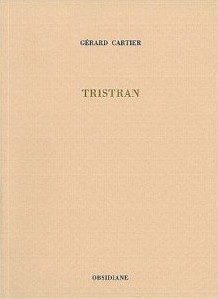 |
|
|
|
The book (whose first traces can be
found in The Chance,
published in 2004 by Obsidiane)
carries the legend of Tristan into the end of the last century, amidst
the Irish crisis which was then shaking the UK. But all that matters is the
wild and desperate love uniting the lovers, which can not be resolved
but in death:
They wish to suffer
this passion that wounds them
And that all their reason condemns...
The poem freely interprets the
story, restoring the ambiguities that time's alterations give to
the ancient manuscripts.
To order: [lx] press -
Make Now Books
The
French version was published
by éditions Obsidiane (2010)
|
.II.
They had dreamed too much haunted
too long
The marsh mists So many strange fables
Flood so soon withdrawn so many magics
Men and beasts intermingling and begetting
Longhaired bulls Morholts
Then in the east a black company disembarks:
Over his thigh Cromwell exsanguinates the golden
Horned goat An poc ar
buile
And extends his pattern on this light isle
Henceforth may need govern Passions
Laced up in a tight corset and the stone
Of eloquence broken Henceforth
Silence and digging ditches
Faces turn toward Tara Headstones collapse
The island tumbles in the wind
Exhausted given over to hunger’s grass
Heavy boats filled with children
Sail into the west in the paths of monks
Lost at sea in their leather troughs
Such sadness as far back as memory
They have listened too much to curses loved
Death too dear...
.VII.
On the sticky table a ripped
newspaper
IRISH INDEPENDENT four
stained pages
A half-moon of beer and ashes The title
Drowned in paper the names mutilated
Trembling I decipher the wayward words
Death and tears and again death
But the truth tonight is not my pride
And alone apart amid the shadows
I make despite myself of these mean shreds
A sweet honey Tristan!
The hand hurries over
The back of a raffle ticket
And I dream carried off by the bittersweet ale
O to fall in love again kneeling
In the soft earth and praising the lovers
Freeing from the peat entwined forms
Their dislocated limbs taken by the roots
Prey to petrified desire that a breath
May bring to life and render to their folly eyes
Reopened limbs washed the soft parts
Swollen by the humors seats of virtues
And passions Such great
joy such great…
A finger on their wounds to suffer
Their fate...
.XII.
He gives himself over to providence
Buttes and valleys
Arm knotted in a kerchief teeth gritted
Staggering between two floating worlds
Woods and colorful moors wandering clouds
Running to the border an indecisive track
One evening in the glens an abandoned hamlet
Where for two hundred souls a priest founded
A communist eden He breaks a pane
And slips into the school A mean amphitheatre
With desks oily under dust To find
One’s place in the row and come back to oneself
Crouched in dim light Planks
Lined with vials and historiated books
On the wall the world map where under the chalky fingers
Of generations of masters Ireland has disappeared
Sucked into a deep whirlpool
Like another Atlantis abandoned to the sea
To escape shame and famine
Then laid on a bench in the middle of this world
Filed by order and kingdom Fuchsias and ferns
And animals vanished with childhood
The Badger and the pale Stoat the Salamander
To rock in naive sleep...
2
Drunkenness
.V.
She is kneeling close and terrible
Begotten by fever Her curls
Tinged red by ass dung Lips swollen
Frail and milk-white a block of magnesia
Tepid moon in the rising sun If the eye
Could withstand this dawn without blinking
The hand push back the inexorable hand
That rips linen and slowly searches
The body Charity a blade
Sharpened in fire But does it matter
If burns this miserable flesh
There is a sharper pain the heart
Quails and holds to life
Only by this eye that pours with mighty fire
Chance does its work Tristran
Gives himself shivering May
God make it virtue
Nothing can heal him now Love
Nor refusal Nothing can free him
Fleeing nor staying Nor merging
With the deep peat...
.VIII.
Sun cleaves the dust The room
Opens like a crypt She is before him
Stern forehead chastened hair arms
And ankles covered and all magics
Obscured I see her again beyond years
Black nun escaped from centuries of plague
Leaning over my bedstead black hair shirt…
He closes his eyes ether dissipates fire
Makes the flesh shriek Pain faithful and firm
To which he gives way without restraint Benediction…
To escape the light breath
That flows over him in anima vili
Searching blindly in knotted linens
The chink through which to penetrate under which beats
The soft substance of feeling How
To shy away
He cries out a name that his throat
Cannot contain vinegar or honey
Ysé pales her hand held out
Wide-eyed What curse
this…
Overwhelmed by a madness beside which
There is no wisdom...
.Fragments.
The sun is already high and the light
thin. in the window frame a garden of box trees. a chalky alley ends in
a wall. his mind slips away. he dislikes this cruel
fable, a savage love unknown here. he counts and numbers the lines.
such long arithmetic before
getting to this lesson he cannot formulate. I know not what I say…
Forty lines per column, two columns per
page. week after week, the company of blackbirds, then fine hail that
makes the roofs sparkle. long labor to reinvent a
lost emotion. uncertain names, words half forgotten, crossed out one by
one from the
nomenclature.
Then the book is lost. devoured by
cockroaches. moldy from storms. butchered for its red chalk images.
covered over by the epic poem of a country demi-saint. carried
away in the fire of a protestant seminary.
One day, in the binding of a cartulary,
a leaflet cut in two at mid-height is found. the knife has taken away
one edge: on the front, the beginning of the lines of the
first column; on the back, the rhymes of the second. a stanza is hidden
in the binding. the tale
stumbles over a shaky line: such
great joy such gre[at]…
Of the 13,000 lines only 3,000 remain,
some half-cut off. five fragments: the island, the union, the orchard,
and the hall of images. then it’s the end. in a
vignette, the lovers sit side by side. he holds her hand, she bows her
forehead toward him. they are enveloped in
red as if in a blaze.
We piece together snippets. we reckon.
we dream of a lost unity.
.V.
One could imagine a swamp in the
middle of the moors
at the foot of the slag heaps an
abandoned orchard
prune trees with wild fruits
tiny snow flowers
I could describe paradise
not a roof for more than thirty miles
sometimes
crossing the hills
a quail or a pheasant
just out
of the naturalist’s notebook
spring makes tall the fields
the colors spread
like
malmsey wine
with the evening dew nights beautiful with stars
In orchard
under the hawthorn
she
has her lover till morn...
one could imagine
the gleaming water and the cool planets
and the
lovers
taught at
the school of the Garden
.IX.
I too
as soon as my eyes could focus
and my
lips promise
I too
faced with the empty mountains
I dreamed
it a book
in the left hand
coming back to the beginning
and
finding
primitive virtues
an elegy for a wild land
and still
today
cloistered in this dark city
a room delivered to the north
exhuming
the first
words
nostalgia tears me
from my austerities
But coming after all
bringing together what is no longer
what is
erased in the powder
of formless snippets
how
to
glorify the desert
a a poor elegy
difficult
as the
mountain of paradise
the rules so slack
so
troubled the passions
that saying joy
or innocence
our
praise turns against us
that finding in a breath
the
infancy of language
in bright images
we mix in
bitterness...
.XVI.
Woods and moors all this vast land
There was no acre that wasn’t theirs
Shut in between three landmarks in the Morois
Three hills as mobile as thought
What united them must yet be left
Eyes turned away Here is our end
A windy tower in an orchard of thorns
And mines crumbling under a yard of grasses
Only the jackdaws’ cries will praise the moor
The peat will swallow this slim monument
Where they have engraved the words of paradise
Their love will be less than a winged seed
He looks north in a furrow a fire
Tortured by the wind The common world
I will go alone in winter without joy without desire
There is nothing beyond this desert
She implores him in vain Their farewells
Are a cleft stone She says Love me
From afar as from near and forget
Me never May my love bind to you
Like this ring May it protect you
And never let you rest...
4
Tantris
.II.
Tristran flees and looks
for the way north
To love him and follow him at a distance a finger
On a creased map He passes the Tone
And the Quantocks Drunk and sad like Tu Fu
Ugly counties in the shadow At evening
Station in a holly wood Sows
Ransack the marsh Heavy and penitent sisters
Fed on earth and sorrow
And beyond a double cloister
A chaotic field where tombs collapse
And a narrow oratory left open to rain
He lies down The cold descents In a hole
A bird struggles under the wind’s tail
The last tenant of this smokeless place
Without grace or horizon How did they abide
Sitting on a crate before a broken wall
A ray of silent color How
Sleep and watchfulness Can this abstinence
Fulfill the heart Madness of pride
To see oneself among them and for an illusion
Chase away the world...
.The Separation.
They refuse pleasure. they seek each
other night and day without finding. they know it in their tongue: Nothing to lean on…
of absence they make their bed.
Nothing to touch with one’s lips… an
exercise in solitude.
Nothing can appease their anguish. they close their eyes to see. they
praise a disappointing name. their desire is this pure limit, this
order that can exist only in absence. Nothing
of you ever....
Love is a bitter wine. the penitents confess it, the lustful know it
and do not confess. poets and scholars argue it, as do philosophers of
Reason. and clerics echo it, who know nothing of wine or of
love.
And with them Thomas the talkative. That from which no good can
derive… hammering it unendingly with his eight
feet. That
which wants nothing but torment… the bass
string tight enough to break. seeking light by looking at the
night.
What will become of us without our chimeras? cowardly and
greedy, abandoned to this hazardous world. crude games and
housekeeping books. of the shuffled cards, can only the ass or
the hanged man appear?
.XIII.
He flees into the night A dry
suffering
Blindly seeking his necessity The city
And the quays Heavy industrious mausoleums
And buildings severe as a turn of whist
At dawn in the oscillation of the first headlights
A dusty store window TRISTAN
UND YSOLD Old seamstress’s workshop
With a female mannequin on display Forehead
Covered by a sack Skin pockmarked
Hips and breasts bound Two leather bands
A numbered embrace Slow torture
And strange instruments magnets for desire
A wooden ruler spindles of black thread
And stockings He remains immobile
Dizzy with sleep unraveling sense
In the shadow an old SINGER with a
black wheel
Activating a delicate mechanism
Of nerves and internal organs Chance
Penetrates him like a hypodermic needle
In a low voice he implores this oily spectrum
That suffers in the half-light And tears
Suffocate him...
5
Death
.I.
They run to their end without
mingling
The sea between them like a knife
Tristran now that all is fulfilled
To lose oneself where nothing hinders evil
A mountainous desert closed up like a tomb
Here we meant to come here the central place
Parallel ridges in the middle of the maps
Long raised ravines chapped with lakes
Sometimes on an island an enclosure of fifty perches
Where at intervals between the wild holly
Filters the arrow of a fixed sky Here
Naked and alone deep in Ireland
To keep oneself for she who will change no more…
Now that they are delivered of their tale
Those who labored over a hard chair
Raise their eyes from their dazzled dream
And finding in the shutters the weak light
That descends on their lives they suffer at last
For themselves...
.II.
Far from the maritime provinces Far
from the roads
Ghuagán Barra Two mountains for a cloister
And a lake spread out where an island flickers
Drifting in the wind on its bed of reeds
Here to settle irritating one’s penitence
The passing shadow and the babble of beasts
A naked dog some consumptive sows
And three rows of pea shoots on their slender stalks
Praising the past under a century-old holly
Wounded each month by a copper coin
Blind devotion hammered into the sapwood
The silence grows The mountains slide at a foot’s pace
The slopes are covered with moss and snow
And blood festers as in a leper’s wounds
Here to forget and be forgotten
Hardly connected to the ancient world
By signs known only to oneself A vine
Twined round a rosebush A lodge under the trees
Pierced by morning light On a cross
A name eroded by rains...
.V.
They lied to dazzle us
knotting
passions into braids
shining crowns
and long did they tempt us
far from
walls a garden
where feverish
to join with the lovers
then they
wreck everything
calling desire sin
a leprosy
that consumes the flesh
and has no end
but this
clothing of earth
that must be worn at last
and even
there
embraced
like two plants mingling their roots
They reprimand the lovers
they swallow their name
repeating
what
everyone has said
each his piece
his seed
in the common earth
the spelling changes
and the
countries
a field melting into a marsh
or a whispering island
but
always at
the end of the road
this hole in the earth
where
desire leads
and the madness of loving
perhaps
even
never ending
in secret
to praise it...
.The Second Ending.
I’ve long pushed back this
moment. a cold, grey room, a cot, a sickly sky in a shutter. evening
and morning the shadow of the second Isé. a faraway bell,
sometimes, chanting the common lessons. accompanying him
soundlessly, a couple of leeches stuck to the throat.
He knows and hopes no more. in
you I drank my death… the skin pulls back. the
tendons jut. the stomach bloats. a thick breath on his lips sucks in
and expels dust. for whom to keep this body alive? he is waiting for
her yet, lying against the damp wall. the notches of days blunt in the
plaster.
Ysé sobs, a finger on doubtful lines. She throws herself on
the sea, the storm long carries her sail. then she is here, she trips
on a blind body. I am
not… in a piece of glass, unreachable, the sun
crosses the meridian. I
am not Ysé if I cannot follow you... without
trembling she achieves her destiny. they tumble entwined to the abyss.
The brightness that enveloped them, was it only an illusion? those who
were before us are now silent. they have led us without concern,
traveling the two roads and calling evil the most desirable. time has
perfected their work: corrupting the unspeakable joy and saving the
last pages.
.VII.
They lied to teach us
pandering
to our moods
a gallimaufry of praise and tricks
erecting
far from the world
a fragrant bed
in which to make of oneself an
offering
and to possess
what is not of this world
if they
said poison the gleam in their eyes
and desert
the wild
hills we
didn’t hear
embracing with a shiver
a
powerful vision
where reason did not speak
They fell silent in a hiccup
and sorrow takes us
kneeling
in an acid marsh
that dissolves passions
and
preserves the bodies
for the edification
of
generations to come
thick peat where everything comes back
and the
poison that ran in their veins
runs into the bright flowers
the
thorns
sucked in by their black roots
coloring the berries in the ditches
the moss
and the
stones...
French Critics
|
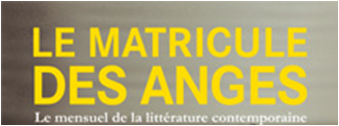
|
Combining
political passion to the adventurous words of the legend and to
personal memories, it is both myth and reality, challenge
and intimate, dream and absolute that Gérard
Cartier
manages to reconcile. From this legend whose roots are lost in the
mists of time, only fragments have survived (...) Cartier
adjusts these bits, transposes them, distils their
charm and
strength, retrieves their music and their silences. It is intense and
addictive, serious and beautiful like a fire in the night. (...) He
says commitment and love sanctified by what seals
them, and
gives voice to everything which, from Tristan and from Yseult, can
still speak to us and reach deep in us.
Richard
Blin (Le
Matricule des anges - July 2010)
|
|
|
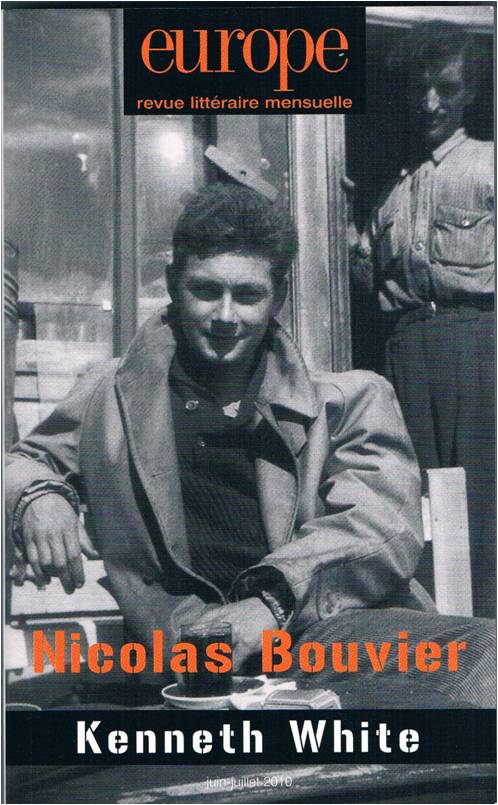
|
This
legend spun off across Europe, and become universal, is its original
color, Celtic, Anglo-Norman and, if one may say, his british accent
that Gérard
Cartier aims
to restore and to transmit in his very personal language; he is
undoubtedly endowed with an historical extend of view and with the epic
spirit that require this voyage of memory and this alchemist job of
recasting the past into today. Gérard Cartier succeeds
brilliantly, not without indulging sometimes in
an excessive sophistication of his prosodic device. (...) So that we
marvel to notice how Gérard Cartier was inspired by the
legend
of another century to invest ours with an idea of love which Eilhard
and Béroul were the intercessors.
Charles
Dobzynski (Europe - June-July 2010)
|
|
|

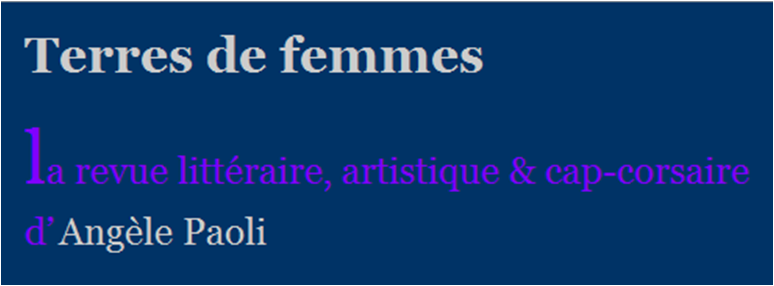
|
To reconvene the
origin of the Celtic tale, from a nothingness of peat and mist. Erased
letters, stained pages, beginning torn
away, the poet is inhabited by shard and splinter. From the very start
of the story, in the summer of another century, the
body of the poet is the body of the book; there, it is not
just question of pages and words, but of trembling clay and flesh.
(...) To embrace the fault, to cherish it. All the strength of this
book: to leave / To lovers from future centuries /
An unwilting praise.
Nathalie Riera
(Les
Carnets d'Eucharis
- June
2010 ; et Terres
de femmes - July 2010)
|
|
|

|
As early as
in The Chance, Gérard Cartier
posed the encounter as
emergence in the text of disparate elements, even dislocated
or torned up, to try to inscribe in it a tale. Tristran
appears to be a polyphonic writing, made of tangled
voices: those of Tristan and
Yseut –
the old lovers –
, snippets of texts, of ancient
landscapes, together with the modernity, sometimes the most sordid one,
and with the narrator's voice. (...) The book of Gérard
Cartier is one of a story that the reader is responsible for relaying,
including for his own account, in order to adress and experience other
stories, until the tales are definitively broken.
Bernard Demandre
(Poète
aujourd'hui- Mediapart
- June
2010)
|
|
|

|
It is a constant
in this poet's work of intertwining eras; let remember, for example, The
Desert and the World (Flammarion, 1997). (...) When the text
says "I am Tristran / This sad century spoils my
blood," who is that "I", if not the
author? But the I author speaks on behalf
of all, questioning
a love in which suffuse the Christian concept of fault, a land where
everything get buried into the peat. (...) This is clearly about our
century and Tristran does not let us forget it. In the legend,
a live bramble
unites the graves of Tristan and Iseut. Once cut, it grows again.
Poetry is
the perennial plant that unites centuries.
Françoise
Hàn
(Les Lettres Françaises - May 2010)
|
|
|
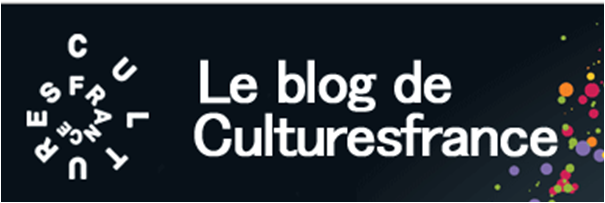
|
The present and the
timeless are closely bound in this long canto of the impossible love,
that death come yet to "sublimate". Due to its hieratic slow pace and
to the constant richness of its language, Gérard
Cartier's writing reaches in these pages a kind of enigmatic and
tormented transparency. With regard to the stanzas of which he has
invented over the years the exemplary form, both regular and
tumultuous, they find with this Tristran a
kind of completion –
and of baroque wisdom –
which bears in filigree the dream of erasure of his author "If
any still sing it is in a whisper, and the song remains strange to the
singer."
Yves di Manno (Blog of Cultures
France - April 2010)
|
|
|

|
A novel in verse:
can we say that of Tristran? Lines, here, are all kinds, verses, stanzas,
free verse, a great variety of approaches that embrace
either narrative or declamation, or confidence (the withdrawal dear to
Seamus Heaney, whose presence is here discreetly perceptible):
the legend is intertwined with the present of writing. (...) Surely,
one must be a
poet to write "in the years of this age" these pages as full of
melancholy as of beauties.
Ronald Klapka
(Lettre(s)
de la magdelaine - The beauty indefinitely (on the web)
- April 2010)
|
|
|
 |
This book revisits the romance of
Tristan and Yseult through poems that are, at first, passionate
moments of Tristran for Ireland, its history, its culture, and which
gradually mingle with the love for Ysé, echoing thereby the name
of Claudel in Le
partage de midi and signing a linguistic shift – which is reinforced by the reversal of Tristan in Tantris – of the original tale, shift which can also be found in imaginative formal researches.
Jean-Pierre Balpe (HyperFiction,
blog invited by Libération - April 2010)
|
|
|
Haut de page
|



